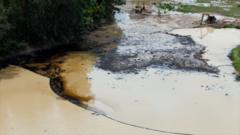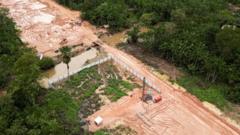Winemaker Maxime Chapoutier has launched two innovative wines, Hemispheres Red and White, blending French and Australian grapes that are illegal in France due to strict EU regulations. While some embrace this global approach to winemaking as a needed evolution, others fear it undermines the foundational principle of terroir.
Mixing Terroir: The Evolution of Global Wines Brings Controversy in France

Mixing Terroir: The Evolution of Global Wines Brings Controversy in France
Maxime Chapoutier's illegal French wines spark debate as he defies traditional wine laws, blending French and Australian varietals for the UK market.
Maxime Chapoutier, a prominent French winemaker, is at the center of a brewing controversy as he prepares to launch two new wines that would be illegal in his home country. The wines, known as Hemispheres Red and Hemispheres White, combine both French and Australian base wines, a practice that runs afoul of strict EU and French laws prohibiting such blends.
Chapoutier, who runs a family wine company with over 200 years of history, believes his provocative approach could incite much-needed outrage and discussion in France's rigid wine culture. He asserts the importance of adapting to changing consumer preferences, given that many are turning away from French wines, confused by the complex appellation systems governing them. "Sometimes you need to be provocative to drive change," he states.
The new wines are exclusively sold through the UK-based retailer, The Wine Society, thanks to deregulations following Brexit that exempt the UK from EU wine laws. The red wine is created from syrah grapes, while the white wine blends marsanne and viognier varieties. The Australian components are imported in bulk, blended with French wine, and bottled in the UK.
Despite the move towards international blends, the response from traditionalists has not been welcoming. Independent German winemaker Jas Swan voiced concerns that a rise in cross-continental wines will lead to lower-quality products. Similarly, renowned master of wine Peter Richards critiques the novelty aspect of such blends while wine expert Jamie Goode acknowledges the fun and potential for innovation, given proper craftsmanship.
The head of buying for The Wine Society, Pierre Mansour, shares that this initiative coincides with the company’s 150th anniversary and aims to explore innovative blending methods that might address climate change impacts. "We did expect 'terroirists' to say 'hold on, this is fundamentally against the French principle of wine,'" he admits, but was pleasantly surprised by Chapoutier's enthusiasm for the project. This distinction between traditional and innovative winemaking methodologies continues to generate passionate discussions within the industry.






















